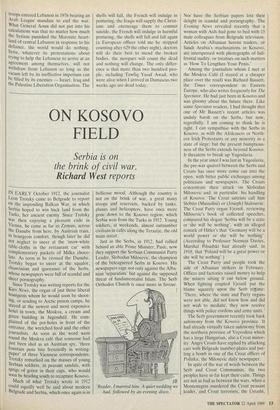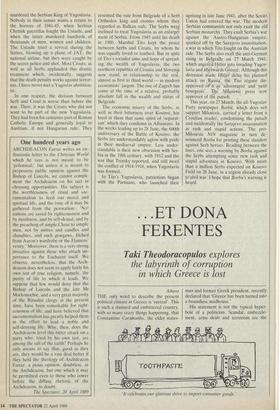ON KOSOVO FIELD
Serbia is on the brink of civil war.
Richard West reports
IN EARLY October 1912, the journalist Leon Trotsky came to Belgrade to report Oil the impending Balkan War, in which Serbia hoped to win back land from the Turks, her ancient enemy. Since Trotsky Was then enjoying a pleasant exile in Vienna, he came as far as Zemun, across the Danube from here, by Austrian train, in bourgeois Comfort, though later he did not neglect to sneer at the 'snow-white table-cloths in the restaurant car' with Complementary packets of Milka choco- late. As soon as he crossed the Danube, Trotsky began to sneer at the squalor, Chauvinism and ignorance of the Serbs, Whose newspapers were full of scandal and sheer pornography.
Since Trotsky was writing reports for the Kiev News, the organ of just those liberal bourgeois whom he would soon be shoot- ing, or sending to Arctic prison camps, he stayed at the newest and most expensive hotel in town, the Moskva, a cream and green building in Jugendstil. He com- plained of the pot-holes in front of the entrance, the wretched food and the other Journalists . As soon as the word went round the Moskva café that someone had just been shot as an Austrian spy, 'three fountain pens bite frenziedly in writing- paper' of three Viennese correspondents. Trotsky remarked on the masses of young Serbian soldiers, in peasant sandals, with Sprigs of green in their caps, who would soon be heading south to recapture Kosovo. Much of what Trotsky wrote in 1912 could equally well be said about modern Belgrade and Serbia, which once again is in
bellicose mood. Although the country is not on the brink of war, a great many troops and reservists, backed by tanks, planes and helicopters, have once more gone down to the Kosovo region, which Serbia won from the Turks in 1912. Young soldiers, at weekends, almost outnumber civilians in cafés along the Terazije, the old main street.
Just as the Serbs, in 1912, had rallied behind an able Prime Minister, Pasic, now they support the Serbian Communist Party Leader, Slobodan Milosevic, the champion of the beleaguered Serbs in Kosovo. His newspapers rage not only against the Alba- nian 'separatists' but against the supposed threat of fundamentalist Islam. The Serb Orthodox Church is once more in favour.
'Reader, I married him. A quiet wedding we had, followed by an evening disco.' Nor have the Serbian papers lost their delight in scandal and pornography. The Evening News revealed recently that a woman with Aids had gone to bed with 15 male colleagues from Belgrade television. Articles on Albanian heroin traders, or Saudi Arabia's machinations in Kosovo, are interspersed with photographs of full- frontal nudity, or treatises on such matters as 'How To Lengthen Your Penis.'
Among the journalists whom I met at the Moskva Café (I stayed . at a cheaper place over the road) was Richard Bassett, the Times correspondent in Eastern Europe, who also writes frequently for The Spectator. He had just been in Kosovo and was gloomy about the future there. Like some Spectator readers, I had thought that one of Mr Bassett's recent articles was unduly harsh on the Serbs, but now, regretfully. I am coming to think he is right. I can sympathise with the Serbs in Kosovo, as with the Afrikaners or North- ern Irish Protestants or any minority in a state of siege; but the present bumptious- ness of the Serbs extends beyond Kosovo. It threatens to break up Yugoslavia.
In the year since I was last in Yugoslavia, the pre-war quarrel between the Serbs and Croats has once more come out into the open, with bitter public exchanges among politicians and newspapers. The Croats concentrate their attack on Slobodan Milosevic and, in particular, his handling of Kosovo. The Croat satirists call him Slobito (Mussolini) or (Joseph) Stalosevic. The Croat Party organ V jesnik, reviewing Milosevic's book of collected speeches, compared his slogan 'Serbia will be a state or she will be nothing', with an alleged remark of Hitler's that 'Germany will be a world power or she will be nothing'. (According to Professor Norman Davies, Marshal Pilsudski had already said, in 1918, that 'Poland will be a great power or she will be nothing'.) The Croat Party and people took the side of Albanian strikers in February. Offices and factories raised money to help the miners sitting it out below ground. When fighting erupted Vjesnik put the blame squarely upon the Serb regime: 'There, where the state and Party organs were not able, did not know how and did nOt wish to mediate, they now resolve things with police cordons and army units.'
The Serb government recently took back autonomy from the Kosovo province. It had already virtually taken autonomy from the northern province of Vojvodina which has a large Hungarian, also a Croat minor- ity. Angry Croats have replied by attacking cars with Belgrade number-plates and put- ting a bomb in one of the Croat offices of Politika, the Milosevic daily newspaper.
In 'spite of the war of words between the Serb and Croat Communists, the two peoples have so far kept their calm. Things are not as bad as between the wars, when a Montenegrin murdered the Croat peasant leader, and Croat terrorists,. the Ustashi, murdered the Serbian King of Yugoslavia. Nobody in their senses wants a return to the horrors of 1941-45, when Serbian Chetnik guerrillas fought the Ustashi, and when the latter murdered hundreds of thousands of men, women and children. The Ustashi tried a revival during the Sixties, blowing up a plane of JAT, the national airline, but they were caught by the secret police and shot. Most Croats, as well as all Serbs applauded this drastic treatment which, incidentally, suggests that the death penalty works against terror- ists. I have never met a Yugoslav abolition- ist.
In one respect, the division between Serb and Croat is worse than before the war. Then, it was the Croats who did not want to be part of the new Yugoslavia. They had been for centuries part of Roman Catholic Europe and generally loyal to Austrian, if not Hungarian rule. They
resented the rule from Belgrade of a Serb Orthodox king and cronies whom they regarded as Balkan oafs. The Serbs werF inclined to treat Yugoslavia as an enlarge, ment of Serbia. From 1945 until his death in 1980, Marshal Tito kept the peace between Serbs and Croats, by whom he was equally loved or loathed. But in spite of Tito's socialist aims and hope of spread- ing the wealth of Yugoslavia, the two northern republics of Croatia and Slovenia now stand, in relationship to the rest, almost as first to third world — in modern economists' jargon. The rise of Zagreb has come at the time of a relative, probably absolute fall in the wealth and status of Belgrade.
The economic misery of the Serbs, as well as their bitterness over Kosovo, has bred in them that same spirit of 'separat- ism' which they condemn in Albanians. In the weeks leading up to 28 June, the 600th anniversary of the Battle of Kosovo, the Serbs are understandably aglow with pride in their mediaeval empire. Less under standable is their new obsession with Ser- bia in the 19th century, with 1412 and the war that Trotsky reported, and still more the conflict of 1914-1918, when Yugoslavia was formed.
In Tito's Yugoslavia, patriotism began with the Partisans, who launched their
uprising in late June 1941, after the Soviet Union had entered the war. The modern Serbian communists not only exalt the old Serbian Monarchy. They exalt Serbia's war against the Austro-Hungarian empire, sparked off by the Sarajevo assassination. a war in which Tito fought on the Austrian side. The Serbs also exalt the anti-German rising in Belgratle on '27' March 1941, whin angered. Hitler into Mvading Yugos- lavia and afteiwArds Greece. Although this diversion Made •Hitler delay his planned attack on Russia', the Tito regime dis- approved, Wit iS. 'adventurist' and 'petit bourgeois'. The Milosevic - press now approves of tlie putscti. This year, on 27 March',, the all-Yugoslav Party newspaper BOrbti, which does not support Milosevic, carried a letter from a Croatian 'reader, candemning the putsch and incidentally the Sarajevo assassination as rash and stupid action. The pro- Milosevic NIN magazine in, turn de- nounced Borba for printing these slanders against Serb heroes, Reading between the one sees a warning by Borba against the Serbs attempting some new rash and stupid adventure in Kosovo. With more than a 'million Serbs expected .on KOsoVo Field on 28 June, in a region already close to civil war, I hope that BOrba's Warning is heard.



































































 Previous page
Previous page